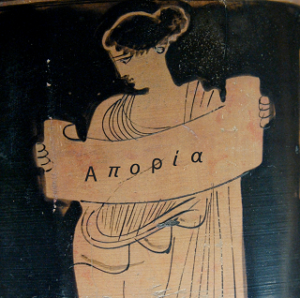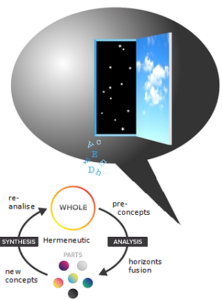
Arquivo para a ‘Antropotécnica’ Categoria
Beyond tiredness, the present moment
Several factors succeeded can put our lives in  disharmony, even if they are involuntary, deaths, tragedies, misunderstandings, etc. It may seem like little or nothing can do to change them, a familiar formula that is meditation and / or prayer may seem. escape.
disharmony, even if they are involuntary, deaths, tragedies, misunderstandings, etc. It may seem like little or nothing can do to change them, a familiar formula that is meditation and / or prayer may seem. escape.
There are several cultural currents that think of an appeal or religious that associate them with the new age, but the society of tiredness has discovered contemplation, Byung Chul Han wrote about this, Sloterdijk his master warned of “a de-spirited ascesis”, both are not Christians, and both may encounter aspects that call co-immunity or even contemplation.
Gradually the troubled mind becomes clear again, choosing a thought or attitude to make the day better, seeking a way to calm and relax and overcome conflict situations.
Psychopolitics, and the resurgent attempt at control of people, must have a calm reaction to claim that this is not working without upsetting anyone around them and to prevent them from making the moment, to try to control the attitudes of those around them.
Finally, what we wrote yesterday, in the midst of turbulence, even war are possible moments of truce, of happiness if we live detached from what is past and no longer exists.
The number of growing social problems will require attitudes not to fall into some form of psychic illness, depression, discouragement, dejection, or heavier syndromes.
There is a profoundly positive side to this, some form of spirituality has become urgent, and so far there are dangers because there are few who promise what they do not deliver: peace of mind, for social peace will take time and the obstacles to be removed are huge, but we have to do it too.
When watching movies, books and culture, of course of high level, everything seems to point there, a resumption of Being, uniting objectivity and subjectivity, action and contemplation may at last cost, but something will have to reflect and leverage a more “human” future beyond. of the fragmentary humanism of the modern.
Earth-planetarism, a planetary worldview
We have already mentioned that the worldview depends on a vision of the cosmos and life itself, there is still a citizen worldview, Edgar Morin called the land-fatherland and what I call earth-planetaryism. Seeing the planet as Patria, as “common house” in the religious mystical vision, as Gaia in a mythological view, incorporate this view, for the planet itself, living beings including animals and plants and cultures that are the citizenship of living peoples in the Planet.
cosmos and life itself, there is still a citizen worldview, Edgar Morin called the land-fatherland and what I call earth-planetaryism. Seeing the planet as Patria, as “common house” in the religious mystical vision, as Gaia in a mythological view, incorporate this view, for the planet itself, living beings including animals and plants and cultures that are the citizenship of living peoples in the Planet.
Broaden a cosmos-planetary view of the Earth they inhabit. In Edgar Morin’s book he traces in chapters 2 and 3 what this planetary identity would be, and at the same time reveals an exhaustion and planetary agony, there is something that involves beyond the traditions and cultural issues at stake, the worldview depends on how man sees himself as a whole, and this implies an advanced worldview, which admits the new telescopes, which made the Copernican revolution, which are now the new media.
Terraplanism is the most extreme side of this view, but attachment to an earlier view of quantum physics, black holes, the view of a multi-verse implies that the planetary cosmovision is still enlightened and idealistic, stuck to an idea of citizenship , of state and of planet that already is much surpassed, and agonizes in successive crises. In the book by Morin and Anne Brigitte Kern, they point out that the key phenomenon to understand this crisis of planetary proportions is “moral, psychic and intellectual underdevelopment” (Morin and Kern, 2011, 115), including development, and the proliferation of holistic “hollow” ideals and of mutilated visions, the loss of the global, the fundamental and the responsibility “(ibid.).
Broadening this vision requires abandoning pseudo-planetary principles that are Eurocentrists, third-worldists, imperialists and neocolonizers present in the “saviors of the homeland” are left or right, generally unrelated and limited worldview.
A new planetary vision, which respects nature itself, demands a vision of an even wider universe that was thought by Copernicus, Galileo, Newton and the Enlightenment, the eternal dualism materialism x idealism, the imperial religiosity of some religions.
Lack of wisdom to the humble and humility to the wise, it is time to rethink the thought, as Edgar Morin wanted, a time of transdisciplinarity of multi-verse (several universes).
MORIN, E., KERN, A.B. Terra Pátria (Earth homeland.) Trad. Paulo Neves. 6th. edition, Sulina Publishing, Brazil, 2011.
This presentation of the Edgar Morin in SESC in São Paulo Brasil, he talks about this subject:
Cosmology, Worldview and Dialogue
The origin of the Greek word “kosmos” is linked to the idea of order, universe (or multiverse), beauty and harmony, also the cosmos through the position of the stars helped to organize the calendar in the origin of human history, cosmogonies and visions of the beginning and end of the uni- multiverse, of nature and of man.
(or multiverse), beauty and harmony, also the cosmos through the position of the stars helped to organize the calendar in the origin of human history, cosmogonies and visions of the beginning and end of the uni- multiverse, of nature and of man.
The absence of a worldview also impoverishes the view of Being, Emanuel Lévinas examining the theme in his book Ethics and Infinity, a radical critique of the category of totality, typical of Western philosophy that led to the cult of Same and Neutral, absolute thought which led to tyrannies and totalizing ideologies.
In Aristotelian physics, previous to modern physics and unthinkable at that time an astrophysics of the multiverse, he elaborated a static model, of eternal flow of the becoming, submitted to an order, the Copernican revolution put everything in motion, and modern astrophysics recovered the model of “Infinite”, where matter and dark energy dominate 96% of the universe.
The cosmogonies are fundamental to understand the formation of cultures and religious thoughts of diverse peoples, legends and myths can usually be thought around a metaphysics, and the beliefs that make them possible as an explanation of the world.
The worldview is present in any form of thought, so materialism, idealism and spiritualism are cosmovisions, as a partial apprehension of the totality and the solution and encounter of the Other are made in function of this worldview.
Thus, in a dialogue of cultures, imperative for a globalizing world and the demand of a global citizenship although not recognized, it is necessary clarifications of this cosmovision, of way totalizing and while admits the infinite like mystery and becoming.
We find in the Basic Dictionary of Philosophy (Jupiassu, Marcondes, 2008) that cosmology supposes the possibility of a knowledge of the world as a system and as an expression of a discourse, the postulate of a totalization of the world, if made by knowledge, of an eventual cosmology of knowledge itself.
JAPIASSÚ, Hilton e MARCONDES, Danilo. (2008) Dicionário Básico de Filosofia. (Basic Dictionary of Philosophy), 5a.ed. Rio de Janeiro: Zahar.
The video below shows the Cosmic vision of David Southwood of ESA (European Space Agency):
The majority and the identitary
Few know this name, the opposite of transsexual is cis, also Christianity and the fact of being white can be a difficulty of dialogue with other groups, however, democracy and rights require that these dialogues are also made.
fact of being white can be a difficulty of dialogue with other groups, however, democracy and rights require that these dialogues are also made.
It is not only an ideological or partisan position, but this is how one sees most, in the religious case there is still one thing unique in Brazil that could be positive and is not, the so-called religious syncretism.
I would say more in the Brazilian case, the blacks if counted browns and mulattos are majority, what would be the ideological war that a good part of the right thinks, nothing more than the refusal of the dialogue.
The dichotomy that has established itself in Brazilian society is detrimental to all Brazilians, and the so-called “cultural war” can lead the country to extremes never before thought.
The identitary that in the American case led a certain right to power, the opposition is not quite a left, in the Brazilian case it can open deep cracks in the nation, thinking of people and not just patriotic symbols, without this leading to a short-term perspective. In the long term, only a resumption of dialogue will make possible new advances and new ways of democratizing rights and also duties to its citizens, building a new identity citizenship requires that we see the whole of society as it is: a miscegenation of peoples, races and religions.
The studies done by Mario de Andrade for Macunaíma may be a good start to this dialogue, although of course there will be those who make him demonic as well. The process of “estrangement” from Brazilian society with its own identity, which is undoubtedly a miscegenation, can have two ways to deny a half of the population with catastrophic effects, or to include the two halves and lead the country to an example of tolerance.
I twist and fight for the second case, although at this point it seems almost impossible.
Among the various reviews I found on the Web, Luana Werb is a good introduction to reading Macunaíma, if you are interested, access the link below:
Between Aporia and Aletheia
The Greek word Aporia (Ἀπορία) meant in Greek Mythology impotence, difficulty and helplessness, or even the lack of means, was rethought by the Aristotelian school as impasse, paradox, doubt, uncertainty or even contradiction, its studies are called aporetic.
or even the lack of means, was rethought by the Aristotelian school as impasse, paradox, doubt, uncertainty or even contradiction, its studies are called aporetic.
Aristotle defined it as “equality of contradictory conclusions” (Topics, 6.145.16-20).
It is important because it broke apart, albeit in a participatory way, as the logic of Being or Not Being, and there can be no contradiction, which came to be in contemporary idealism.
It is radically different from Aletheia, because it is cover-up, not contradiction and so was designated by the ancient Greeks as truth and reality, simultaneously.
Heidegger takes it back in the attempt to “unveil” the truth, it is considered an objective descriptive state, and therefore lacking a metaphysical or subjective movement.
Aporia was also used by contemporary authors, such as Derridá and Paul de Man, so in post-structuralist literary theory, is thus the very deconstructive reading of the text, which we have previously warned has nothing to do with denying the truth, but indeterminacy or undecidability .
The sense of putting them together here is precisely to seek a relationship that in contemporary theory is disconnected, being itself an aporia, the linguistic turn seems to have nothing and no connection with the ontological, so aporia and aletheia are disconnected, the Greeks little help because reading is in the past participle and not present participle.
It is curious, but it was Portugal who warned me of the fact, here is not used the gerund: someone is talking, it is saying they say, thus nothing will be, but it is being, said Priest Manuel Antunes: “mystical people, but not metaphysical” (Repensar Portugal).
While aporia is a past participle, it becomes fatalistic, undetermined as the search for truth, and aletheia while unveiling is a constant search for horizons, where there is no definitive truth, but truth in construction: being, revealing, happening.
Philosophical, political and especially religious determinism leads to various types of fundamentalism, from pure aporia to pure “truth”, there is neither dialogic nor unveiling.
Heidegger ‘s hermeneutic circle is not only a method, it is unveiling, to admit the idea that we all have a pre – concept is to unveil to the crisis of modernity, legalism and idealistic positivism gave what it gave, a no way out, but humanity itself points out ways, one already is clear: admitting that there are preconceptions is the only remedy and diagnosis capable of overcoming them.
Cultures, religions and political concepts are in shock this is aporetic, can and should enter into humanistic dialogic, ie unveiling and pursuit of horizons.
Fight for peace, meekness and justice
The history of mankind is to this day a war story of the Same against the Other, the book The Expulsion of the Other by Byung-Chul Han is nothing more than the realization of this reality. It is our destiny, a fatality, I think not, when peace has been spoken of most, if war is spoken of, peace can be thought of, the Earth as a human homeland.
the book The Expulsion of the Other by Byung-Chul Han is nothing more than the realization of this reality. It is our destiny, a fatality, I think not, when peace has been spoken of most, if war is spoken of, peace can be thought of, the Earth as a human homeland.
The challenges are immense, and fears grow with each new authoritarian government, it is good to say there are also islands of the left and right-wing stronghold that are only “elected” people.
I do not think of resistance or opposition, I still think of transformation, the great setback that happens in all humanity, if it were located it would be easy to have only one reading: we can not go forward, the nostalgists say: “how good was those time” , which ?
To fight for peace must also be for justice and against all sorts of oppression, to magnify simple wisdom and to understand that it takes depth to be simple, a “sophistication” as Leonardo da Vinci said, and to establish a spirit of meekness where it is possible to think.
Not without realizing an excessive dose of authoritarianism is time to ask, what is the exact place of the state in everyday life? its abrupt interference even in the personal life is but a form of authoritarianism? we have cameras and radars every kilometer, it’s not an exaggeration.
Weapons for peace, does not make the slightest sense, more weapons more violence, never the other way around. They remember the biblical beatitudes Mt 5,5: “Blessed are the meek, for they shall possess the earth,” of course what you see today is power in the hand of rabid and authoritarian, but it is not the end.
The following long verse is practically a warning to justice Mt 5: 6: “Blessed are the hungry and righteous, for they shall be filled,” and further Matthew 5: 9: “those who promote peace, because they will be called children of God “, did humanism die? The fact that everyone, or at least a large part of humanity, has a perception that something needs to be done urgently to overcome the “dangers against humanity” challenges us.
There is an urgent need for global governance, not less urgent income distribution programs. The ecological collapse, and in the big metropolis also the urban demand global measures.
I remember the two beatitudes as a stimulus for those struggling for humanity suffer persecution, injustice and slander. Mt 5,11 “Blessed are you when they revile you and persecute you, and when they lie, they shall say all manner of evil against you for my sake,” that is Christianity, the rest wickedness
To quench fears and hatreds: meekness
There is little philosophical literature on meekness, but on fears and hatreds are abundant, we explored this in the posts of the previous week, now we want to mature and overcome both the hatreds, the fears and especially the hurts that entered our lives is necessary something related to temperance, meekness and of course a good deal of critical wisdom.
abundant, we explored this in the posts of the previous week, now we want to mature and overcome both the hatreds, the fears and especially the hurts that entered our lives is necessary something related to temperance, meekness and of course a good deal of critical wisdom.
It could be combined with peace, with tolerance, but they are matters with direct relation to the social, to the just and mainly to some dose of power in the positive sense that we said in our previous post, inner peace or resilience interior as a form of tolerance are nothing other than the negation of the external social and human context.
Meekness is that force capable of even before the contradictory being able to hear, argue and in many cases just shut up until the other person can hear.
Unlike “inner peace” or the social concepts of peace, it is a peaceful way of looking at the world, the Other beyond its limitations, its momentary or habitual outbursts, and is able to convey serenity and calm in hostile environments.
Fears are born of immaturity, incomprehension or fragility in the face of a situation, the use of arms does not lead to greater meekness, leads the attempt to take fear to the other, but almost always this builds an escalation of hatred.
Now it can be conjugated with the idea of social peace, the Roman pax foresaw the submission of the peoples, the Pax of Westphalia, which was nothing more than a treaty of religious tolerance that would lead to a political peace, already the eternal right of the state of interfere in a conflict, even with violence if necessary, this returns the discussion in the Brazilian reality.
Kant argued that “by the use and predominance of reason, by the constitution of the individual sphere, the construction of the modern individual, by the establishment of the public space for the debate and resolution of social conflicts,” such was the constructive model of the eternal pax of modernity, without meekness, a dose of interpretation of hermeneutics of interpretation.
This discourse reminds Heidegger that he has an essay on Serenity (1959), Byung-Chul Han recalls that “serene courage to face an essential fear” [Heidegger], and when this fear lacks, the identical remains, is at the mercy of the “silent voice” that “awakens him with the horrors of the abyss.”
The expulsion of the Other
Byung-Chul Han’s gaze on contemporaneity could not be more authentic for the author of  , the Salvation of the Beautiful and the Aroma of Time, among other books of course, but has in its first pages the relationship with all this and the beautiful: “If a flower had in itself its ontic fullness, it would not need to be contemplated” (Han, 2016, 13), this sentence is paradoxical but it is not, it is in his book “A expulsão do Outro” (the expulsion of the Other) (Han, 2016).
, the Salvation of the Beautiful and the Aroma of Time, among other books of course, but has in its first pages the relationship with all this and the beautiful: “If a flower had in itself its ontic fullness, it would not need to be contemplated” (Han, 2016, 13), this sentence is paradoxical but it is not, it is in his book “A expulsão do Outro” (the expulsion of the Other) (Han, 2016).
The author analyzes the question [in Max Scheler] of Saint Augustine to attribute “in a strange and dangerous way ° a necessity to plants:
“That men behold them, as if, through a knowledge of their being guided by love, they experienced something analogous to redemption” [Han apud Scheler, 2016, p. 13).
Han clarifies that knowledge seen in this way is redemption, but it should be noted that there is no way in this form to separate subject from object in contemplation, which is discussed at length in his other book, The Society of Fatigue. object while another.
In this the author distinguishes the simple news or information, “to which the dimension of otherness is utterly lacking” (idem, page 13), that which would be able to reveal a new world, a new understanding of what it really is, suddenly that the new one appears (idem).
Going back to Heidegger, he asserts that all this false objectivity means nothing other than “otherwise this blindness to events” (Han, 2016, 14).
Although his view is excessively pessimistic about the network and the digital, he is right in saying that “proximity brings in itself distance as its dialectical opposite. The elimination of distance does not generate more closeness, but rather destroys it “(Han, 2016, p.15) and pronounces it categorically, which in the absence of distance or the identical that it creates contains life.
He retakes the theme of another book “The Agony of Eros”, saying that “in pornography all bodies resemble” and the body is reduced to sexual does not know anything else.
He makes a quick analysis of the animation film Anomalisa (pictured above) made by Charlie Kaufman in 2015, which reveals the hell of the identical, puts the painting Golconda by René Magritte, the Belgian surrealist in his book “Swarm”.
The book also analyzes the terror of authenticity, fear and alienation before analyzing the language and thought of the Other, modern thought is nothing else as a consequence of the “forgetting of being”, the separation of subject and object, expulsion from the other.
HAN, Byung Chul. A expulsão do Outro (portuguese edition). Lisbon: Relógio d´água. 2016.
Heidegger and the Power
Although speculation can be made on the question of power in the concept of pre-existence which is a response of Heidegger to rationalism, the being-for-the-end “does not originate first from a posture that sometimes happens, but belongs, in an essential way, to the presence of the presence, which in the disposition (of humor) is revealed in this or that way “(Heidegger, 2015, 327).
which is a response of Heidegger to rationalism, the being-for-the-end “does not originate first from a posture that sometimes happens, but belongs, in an essential way, to the presence of the presence, which in the disposition (of humor) is revealed in this or that way “(Heidegger, 2015, 327).
It is the idea that this being launched, the presence “exists for its end” (idem), the for it is highlighted because it is in the relation with the concept para-si of Hegel, and through this it would be possible to make the speculation of what is in fact the relation Heidegger sees with power, from the presence.
The path we are going to take is more direct, because Heidegger directly analyzed this question, studying the question of the Will to Power in Nietzsche, and the eternal return that indirectly made the analysis in the eternal state and we want to deepen the concept
The affirmation that in our instincts are always present the ideas of will to power, eternal return (in German Ewige Wiederkehr) and superman (in German übermensch), and the last two are driven by the will to power, therefore its main category.
The entity for Nietzsche is not thought as being, but as wanting inherent to the will, so the being that always wants itself in an unstable and insatiable way is what makes it, a metaphysical entity of wanting and not necessarily of Being.
In Nietzsche it is a “makes who you are” worth and not the Socratic principle “know thyself” which is closer to the ontological being, and Heidegger will propose the “confrontation” which is the revision of the original reasoning of thought Western world, around the essence and its necessity, described as follows: “If a more original consideration of being must become necessary from a historical urgency of Western man, then such thinking can only happen in confrontation with the first beginning of Western thought.
This confrontation takes place fully, “it remains closed in its essence and necessity, while the greatness, that is, the simplicity and purity of the fundamental affective tone of thought and the power of proper saying, refuse for us “(Heidegger, 2015). , pp. 479).
It is not by chance that the Nietzschean Brazilian Oswaldo Giacóia Jr wrote “Urgent Heidegger: an introduction to a new thinking” (GIACÓIA Jr, 2013), which is a very precise guide for reading Heidegger, clarifies that Heidegger intends to resume an even more ” originating from that which was experienced in Greece … “(Giacóia Jr, 2013, p. 46), to correspond to the truth of Being as unveiling (alétheia) would still say a return to its essence.
In this context the Being, in a new poesis (the creative and infinite way of thinking the Being), owes above all the will to power that is present in the messianism and mythology of all contemporary thought, source of the authoritarian bases of doing politics and of society.
The eternal return is the most fragile concept, there is no question of historical consciousness or of time, which profoundly differentiates Heidegger’s hermeneutic circle.
GIACOIA JÚNIOR. Oswaldo. Heidegger urgente (Heidegger urgent – Introduction to a new thinking). Brazil, S.P. Três Estrelas, 2013. HEIDEGGER, M. Ser e tempo, 10a. edição, Trad. Revisada de Marcia Sá Cavalcante, Bragança Paulista, SP: Editora Universitária São Francisco, 2015.
Scientific vision and ontology
Contemporary science is the fruit of an a priori concept construction, which can be thought of as that which is prior to experience or perception, in terms of philosophy, this corresponds to two forms of knowledge or argument, when we say in my experience I feel that … it is the argument of perception, when I say I see it this way … it means that I have a world view and I am resorting to it.
thought of as that which is prior to experience or perception, in terms of philosophy, this corresponds to two forms of knowledge or argument, when we say in my experience I feel that … it is the argument of perception, when I say I see it this way … it means that I have a world view and I am resorting to it.
In the ontological phenomenology an “a priori” is also admitted, but it does not mean an “a priori construction”, since it must be dissociated from “empiria”, because in fact even if we can not make explicit our world view, it was socially and culturally constructed, which in the hermeneutic circle are the preconceptions, in the sense that they are somehow formulated.
Just as both scientific research and ontology have concepts “a priori” they can converge, but in practice ontology requires a purification, ie, the explanation of which are the prejudices, for example, idealism or culture.
Every scientific investigation makes an a priori that is the “fixation of the sectors of objects” and is only possible from an opening to the being of being, that is, what is the ordinary experience that it has of the world, sometimes difficult to explain and question.
In order for a true scientific question to be asked, it is necessary to determine the region of the entities, often called contextualization, but at most only corresponds to a romantic view of history (read Gadamer), the region means being taken to the horizon of the original experience, the horizon of the fundamental relation of the entity that questions with the questioned world, usually done in reverse.
In medieval philosophy, the whole discussion of these a priori leads to the quarrel of the universals of Boethius (470-525), who translated Isagoge from Greek into Latin, soon perceived the magnificent program that Porphyry’s questions proclaimed.
At bottom the quarrel is whether there are universals, which would be them, that triggered a struggle between nominalists (everything is name) and realists (they exist independent of the names).
Existential analytics “is before all psychology, anthropology and, above all, biology.” (Heidegger, 2015, pp. 89), although we already say in the previous post Paul Ricoeur affirms that there is in Heidegger (he would say in all ontology) an a priori that is based on anthropology, which we call original for cultural reasons.
Heidegger, M. Ser e tempo, 10a. edição, Trad. Revisada de Marcia Sá Cavalcante, Brasil, Bragança Paulista, SP: Editora Universitária São Francisco, 2015.

